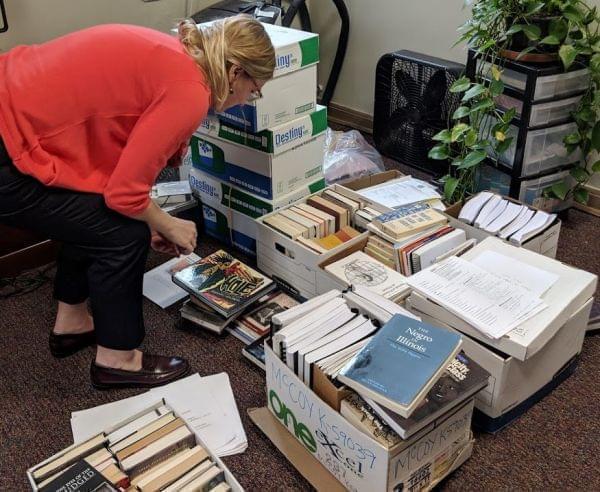Danville Prison Removes Books; Foreign-Owned Farmland; Saving For Retirement

Holly Clingan, Education Justice Project librarian, looks through boxes of books that were removed from the EJP library inside the Danville Correctional Center. Lee Gaines/Illinois Newsroom
We'll hear the story of why 200 books were removed by staff from a prison library in Central Illinois. Plus, when we say American soil, we think that means the farms are owned by Americans, right? It turns out that about 30 million acres of farmland in the US are foreign-owned. And, saving for retirement is a challenge, that’s part of the reason one in five Americans have no retirement savings at all. We’ll hear from one Illinois economist about how to save smarter.
The tariff battle with Mexico may be over for now. But there’s still an ongoing trade dispute with China — one of our biggest customers — cutting off imports of U.S. soybeans, a huge crop here in the Midwest. It shows just how intertwined our farms can be with international markets.
And that’s how we tend to think of global ties to our agriculture, that we’re exporting our goods to those countries. But, it turns out the actual American land crops are grown on can also be international.
That’s because about 30 million acres of farmland in the U.S. are actually owned by foreign investors. That’s according to a recent report from NPR, which also found foreign investment in U.S. farmland has doubled in the last two decades.
A handful of our neighbors, including Missouri, have tried to take steps to curb foreign investment in farmland, while other states like Illinois only require that it be reported.
Joining us to talk about this issue is Joe Maxwell, the former Lt. Governor of Missouri and a fourth-generation farmer there. He’s also executive director of the nonprofit policy and advocacy group The Organization for Competitive Markets based in Lincoln Nebraska. The group advocates for small family farms. Joining us here in the studio in Urbana is University of Illinois professor Bruce Sherrick, who directs the TIAA-Cref Center for Farmland Research and studies farmland investments.
Some states, like our neighbor MO, have tried to take steps to curb foreign farmland investment, while others like IL only require that it be reported.
— The 21st (@21stShow) June 10, 2019
Also--
Prison education programs can go a long way toward helping people who are incarcerated rebuild their lives after they’re released. But access to good programs and materials is often limited.
A program called the Education Justice Project, or EJP, has been a standout for years. Cohorts of men at the Danville Correctional Center take University of Illinois classes taught by faculty.
The EJP had been running smoothly, until early this year. The program was suspended without warning. And then, volunteers at the program’s library discovered that more than 200 books, mostly about race, had been removed by prison staff.
Lee Gaines has been reporting on this for the Illinois Newsroom and she joined from our Urbana studios. Rebecca Ginsburg is on the line from Chicago. She’s the director of the Education Justice Program, and an associate professor at the University of Illinois’ College of Education.
Johnny Page is an alumnus of the Education Justice Program and is now the co-director of programming and outreach of Contextos, a non-profit that works to prevent community violence in Chicago. Alan Mills is the executive director of the Uptown People’s Law Center.
When she found out that staff at the Danville Correctional Center had removed more than 200 books from the library Rebecca Ginsburg said she she "felt sick," reports @LeeVGaines https://t.co/zEjQYdVGwJ
— The 21st (@21stShow) June 10, 2019
The @uplcchicago is suing IDOC for censorship. @alan_uplc agrees that books that teach people how to pick locks shouldn't be in prisons. But he says you shouldn't remove books when you don't agree with their viewpoints, and the Supreme Court has been clear on this.
— The 21st (@21stShow) June 10, 2019
Plus--
According to research from Northwestern University, one in five Americans have no retirement savings at all. One in three of us has less than 5,000 dollars saved.
How much thought have you given to your retirement? Although it’s something most of us are looking forward to, the finances of retirement can be difficult to navigate. Maybe you don’t even feel like you have the time to think about or save for it. So how can you get prepared?
Ben Harris is a visiting professor at Northwestern University’s Kellogg School of Management. He is the former chief economist to vice president Joe Biden.
More insights from @econ_harris @KelloggSchool https://t.co/Ae0RuA39kc pic.twitter.com/AFYzYS2jF2
— The 21st (@21stShow) June 10, 2019
